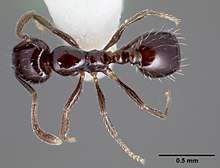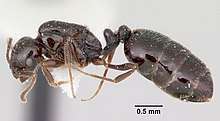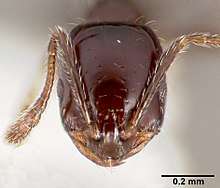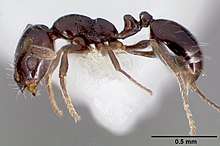Monomorium ergatogyna
Monomorium ergatogyna is a species of ant in the family Formicidae. This species is often mistaken for Monomorium minimum as they are similar in appearance. This ant is a shiny black color and contains only a single worker caste, making them a monomorphic species. It is also polygyne, meaning a colony contains multiple fertile queens living together. They are native to California, Nevada, and Utah and are usually found in cities or on the coast (in California also being found on islands near the coast). When compared to other Monomorium species, they are found to have the longest living queens and can live up 2 years in captivity. Argentine ants (Linepithema humile) have been discovered to be actively pushing this species out of its original territory. [1][2][3][4][5]
| Monomorium ergatogyna | |
|---|---|
 | |
| Scientific classification | |
| Kingdom: | Animalia |
| Phylum: | Arthropoda |
| Class: | Insecta |
| Order: | Hymenoptera |
| Family: | Formicidae |
| Subfamily: | Myrmicinae |
| Genus: | Monomorium |
| Species: | M. ergatogyna |
| Binomial name | |
| Monomorium ergatogyna Wheeler, 1904 | |

Some speculation as to the difference between the island species and the coastal mainland species in California has been brought up. A few argue that the mainland species aren't actually ergatogyna but a different species or subspecies, they point to the size difference of island queens and mainland queens. Another point is that mainland species appear to be allopatric, but more evidence must be brought forward to prove this point. [5]


References
- "Monomorium ergatogyna Report". Integrated Taxonomic Information System. Retrieved 2018-05-06.
- "Monomorium ergatogyna species details". Catalogue of Life. Retrieved 2018-05-06.
- "Monomorium ergatogyna". GBIF. Retrieved 2018-05-06.
- "Monomorium ergatogyna Species Information". BugGuide.net. Retrieved 2018-05-06.
- "AntWeb". California Academy of Sciences. Retrieved 2018-05-06.
Further reading
- Bolton, B. (2016). "Catalogue of the Ants of the World" (PDF). unpublished communication. Retrieved 2019-07-02.